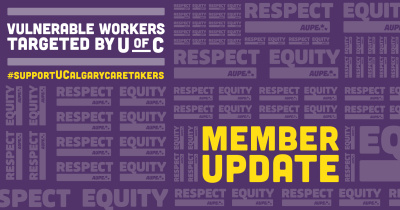Equity, Diversity and Inclusion? Not for UCalgary caretakers
Appeals to UCalgary Vice-Provost fall on deaf ears
Sep 27, 2022
Recently, the University of Calgary made the decision to change the shifts caretakers work to avoid paying them a shift premium of $2.50 per hour.
Caretakers are the most racialized, immigrant, newcomer, and low-income status people on campus. They make $16 per hour, below the living wage in Calgary.
Caretakers and their elected union officials with AUPE Local 052 repeatedly pushed back and argued that this shift change was a violation of the university's Equity, Diversity, Inclusion (EDI) principles.
After months of asking whether EDI principles had been applied in the decision to change caretaker shifts, not only did we not get an answer, but the Vice-Provost of EDI told us to "pre-empt the polemics and rhetorical flourish."
This is salt in the wounds of racialized staff on campus.
Equity, diversity and inclusion, it seems, do not apply to the hard-working people who keep the university clean.
Here is Local 052’s response to Dr. Smith’s last email.
A copy of the communications that led to this point is attached.
Dear Dr. Malinda Smith,
Vice-Provost
Equity, Diversity and Inclusion
University of Calgary
Dr. Smith,
It is hard to express the pain your last response caused to caretakers at the University of Calgary.
At least three times we have asked you a simple question: Were Equity, Diversity and Inclusion (EDI) principles applied when the decisions were made to change caretaking shifts?
Three times you have refused to answer.
Caretakers, other support workers and the wider campus community are now asking a different question: What is the point of having a Vice-Provost of Equity, Diversity and Inclusion if that person cannot or will not answer a straightforward EDI question?
We know you will not answer that question either, so we are forced to put forward our own answer. There is no useful purpose to your position if you do not actively defend the most racialized, vulnerable members on campus.
Your unspoken words are clear: They're only caretakers.
Let us address the points raised in your last communication.
Polemics and rhetorical flourish
You say you want to "pre-empt the polemics and rhetorical flourish ..."
This is a deeply hurtful way to dismiss the serious concerns we have shared with you, to put it mildly. Accurately describing how people have lost thousands of dollars of income and had their lives turned upside down is not "rhetorical flourish," it is speaking truth to power.
You say that "workforce restructuring initiatives are extremely difficult for all involved. They involve real people, real lives and livelihoods. This is serious stuff."
Let us remind you that all Local 052 members understand, perhaps better than anyone, the serious nature of workforce restructuring and the impact it has on livelihoods. It was our members who lost 600 full time jobs in the midst of a global pandemic. It is not the decision-makers who suffer, but rather the working people who are impacted by the decisions to cut.
Calling for fairness and justice is not a polemical attack. Indeed, it is exactly what you are supposed to be doing in your role as Vice-Provost of EDI.
Fairness
You say that you are not "not aware of evidence that demonstrate that the caretakers were unfairly targeted by the last round of restructuring due to budget constraints."
You can't find evidence because you have not looked for it.
There are only three possible ways this played out:
- You didn't ask if EDI principles were applied to the decisions affecting caretakers;
- You asked and were told they weren't applied, but didn't pass that on to caretakers; or
- You don't think EDI principles apply to caretakers.
If you took this issue seriously, you would have looked for evidence, you would have asked questions and you would have shared answers.
Budget
You mention the budget cuts "significantly impacted our campus community." What you ignore is that the university's annual budget is $1.4 billion.
The savings made by the changes to caretakers is minute in comparison to the total budget, but the effect on those workers is massive.
Was there no room in a budget that size to prevent the unfair effects cuts would have on caretakers, who are largely women, people of colour and newcomers to Canada – the very people that EDI is supposed to protect?
The effects of budget cuts have been felt across the campus community, but nowhere has the effect been as damaging as it has been for caretakers.
You might not consider the loss of a shift premium of $2.50 per hour to be significant, but when it amounts to the reduction of $3,600 to $4,800 per year for someone making $30,000 a year, it hurts.
We know that the cuts to the Campus Alberta Grant were forced on the university, but the university chose where those cuts fell. It seems the administration gave no consideration to the unfair effects the cuts had on the most vulnerable people on campus.
Job losses
You repeat the administration's line about protecting the jobs of caretakers, but refuse to acknowledge that the caretakers' concerns were not just about being laid off. It was about the drastic consequences of the shift changes to their income and their lives.
Many caretakers work more than one job. Unilaterally changing their shifts means some have had to give up their university job or a second job. Many struggled to find alternative care arrangements for family members.
You boast about protecting jobs, but give no thought to the quality of those jobs. All of those jobs are now paying below the living wage in Calgary, causing real hardship.
Who was affected?
You say fewer than 25 per cent of caretakers were affected by the loss of shift premiums. The truth is that about half of the 200 caretakers suffered significant negative consequences, whether seeing large cuts in pay, being forced to give up jobs or struggling to meet family obligations when shifts were changed.
Even so, would you dismiss changes to students or professors as being of no concern if only a quarter were affected? No. You would not.
But, well, these are only caretakers, right?
What you didn't say
We invited you to meet caretakers to explain to them face-to-face about what EDI means and how it applies to them.
You did not reply.
Because, well, they're only caretakers, right?
What's next?
The responses we have heard from you and the university leadership have revealed that Equity, Diversity and Inclusion are simply for show at the University of Calgary.
Clearly, the university administration wants only to be perceived as inclusive, but does not want to do the work to reflect critically about how its decisions create inequality on campus for racialized, low-income workers.
The truth is that principles are not principles if you abandon them for the sake of convenience.
Your actions, and the actions of the university leadership, have set the tone for labour relations and social justice on campus in the future.
Sincerely,
Prachi Mishra
Vice-Chair, AUPE Local 052
News Category
- Member update
Local
- 052 - UNIVERSITY OF CALGARY
Sector
- Education

